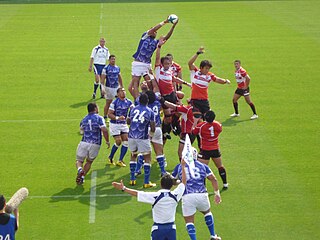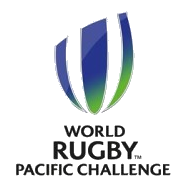
The Fiji national rugby union team represents Fiji in men's international rugby union. Fiji competed in the Pacific Tri-Nations and now competes in its successor tournament Pacific Nations Cup. Fiji also regularly plays test matches during the June and November test windows. They have beaten the major rugby playing sides of Wales, Scotland, Australia, France, Italy, Argentina and England. The only major sides Fiji are yet to beat are New Zealand, South Africa and Ireland.

The Pacific Nations Cup is an international rugby union competition held between three Pacific states: Fiji, Samoa and Tonga. The 2019 edition of the tournament also included the national teams of Canada, Japan and United States. First held in 2006, the tournament is intended to strengthen the Tier 2 rugby teams by providing competitive test matches in a tournament format.

Rugby union in Samoa is the country's most popular sport. The national teams in both the standard 15-man game and rugby sevens are consistently competitive against teams from vastly more populous nations.

Rugby union is the national sport of Tonga. Tonga are considered to be a tier 2 rugby nation by the International Rugby Board.

Rugby union in Fiji is a popular team sport and is considered to be the national sport of the country. The sport was introduced to Fiji in the 1880s. Fiji is defined as a tier two rugby nation by World Rugby. The national team has competed at the Rugby World Cup and made it as far as the quarter-finals. Their sevens team is also noted for their success, winning multiple Olympic gold medals, World Rugby Sevens Series and Rugby World Cup Sevens.

The Fiji Warriors, also referred to as Fiji A, is a national representative rugby team of rugby union in Fiji. It is the second-tier side to the Fiji national team. The Warriors team is selected from players in the Fijian domestic competitions and competes in the World Rugby Pacific Challenge against Samoa A and Tonga A. Since 2016, the Fiji Warriors team has played in the Americas Pacific Challenge against national A teams from North and South America.

Upolu Samoa is a former Samoa rugby union representative team that played in the IRB Pacific Rugby Cup from 2006 to 2010. The other Samoan team in the Cup was Savaii Samoa. The players for Upolu Samoa were selected from all rugby union competitions in Samoa.
The IRB Pacific Rugby Cup 2008 was the third edition of the Pacific Rugby Cup competition. First held in 2006, the 2008 edition, like its predecessors, featured 6 representative rugby union football teams; 2 from each of the three Pacific rugby unions - Fiji, Samoa and Tonga.

The Oceania Rugby Men's Championship is an international rugby union competition for countries and territories from Oceania with national teams in the developmental band. It is administered by Oceania Rugby.
The IRB Pacific Rugby Cup 2009 was the fourth edition of the Pacific Rugby Cup competition. First held in 2006, the 2009 edition, like its predecessors, featured 6 representative rugby union football teams; 2 from each of the three Pacific rugby unions - Fiji, Samoa and Tonga.
The 2011 Pacific Nations Cup was a rugby union tournament held between the four national sides on the Pacific Rim: Fiji, Japan, Samoa and Tonga.
Pampas XV is an Argentine professional rugby union team that currently competes in Super Rugby Americas.
The 2010 Pacific Rugby Cup was the fifth edition of the Pacific Rugby Cup competition. First held in 2006, the 2010 edition, like its predecessors, featured 6 representative rugby union football teams; 2 from each of the three Pacific rugby unions - Fiji, Samoa and Tonga.
The 2011 Pacific Rugby Cup was the sixth edition of the Pacific Rugby Cup competition. The tournament featured national 'A' teams from the three Pacific rugby unions as well as Super Rugby development teams from Australia and New Zealand.
The 2012 Pacific Rugby Cup was the seventh edition of the Pacific Rugby Cup competition. The tournament featured national 'A' teams from the three Pacific rugby unions as well as Super Rugby development teams from Australia and New Zealand.
The 2013 Pacific Rugby Cup was the eighth edition of the Pacific Rugby Cup competition. The tournament featured national 'A' teams from Fiji, Samoa, and Tonga, and the Junior Japan team which was added for the 2013 tournament. The format involved touring to play against Super Rugby development teams from Australia and New Zealand, and was intended include a round robin stage between the four core teams, but this leg of the tournament was cancelled to allow preparation for the end-of-year internationals.
The 2013 Pacific Rugby Cup was the eighth edition of the Pacific Rugby Cup competition. The tournament featured national 'A' rugby union teams from Fiji, Samoa, Tonga, Japan and Argentina. Additionally, four Super Rugby development sides joined the five Pacific sides as core teams for the first time. These Australian teams had previously only been opposition sides for the core teams and were not in contention for the title.
The 2015 Pacific Challenge was the tenth World Rugby Pacific Challenge. The tournament, featuring six national 'A' rugby union teams, was hosted in Fiji. The tournament was won by Pampas XV, who defeated Fiji Warriors by 17–9 in the final.
The Papua New Guinea women's national rugby union team played their first international against Fiji in 2016. They compete annually in the Oceania Rugby Women's Championship, and have not qualified for the Rugby World Cup as yet.
The 2019 Oceania Rugby Women's Championship that was held in Fiji, was the 2021 Rugby World Cup qualifier for the Oceania region. The tournament was played at Churchill Park in Lautoka from 18–30 November 2019, with six teams entered. Australia and New Zealand sent development teams, having already qualified for the 2021 World Cup.











